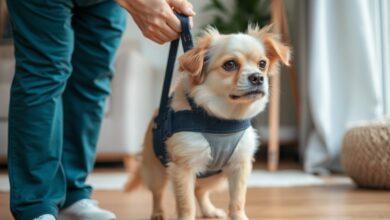Are Doberman Pinschers Good with Other Dogs? Socialization Insights
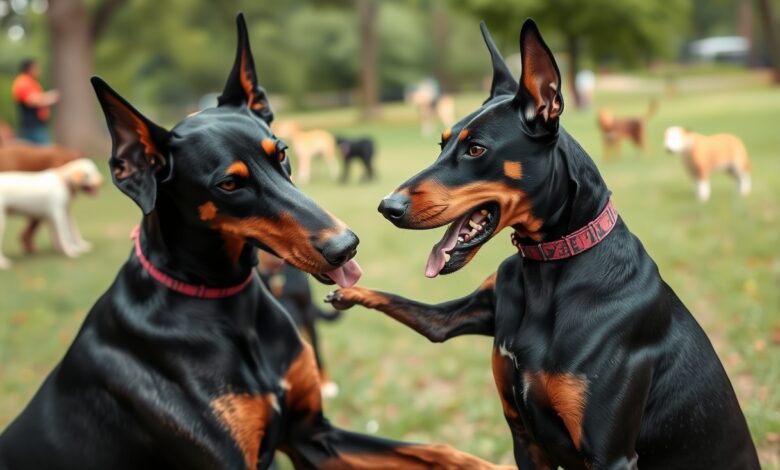
Just like any other breed, the personality of a Doberman Pinscher can vary, making it crucial for you to understand how they interact with fellow canines. With their protective nature, Dobermans may seem intimidating, but when properly socialized, they can thrive in a multi-dog household. This post will guide you through important insights on socialization techniques, ensuring your Doberman grows to be a well-rounded companion, comfortable in the presence of other dogs.
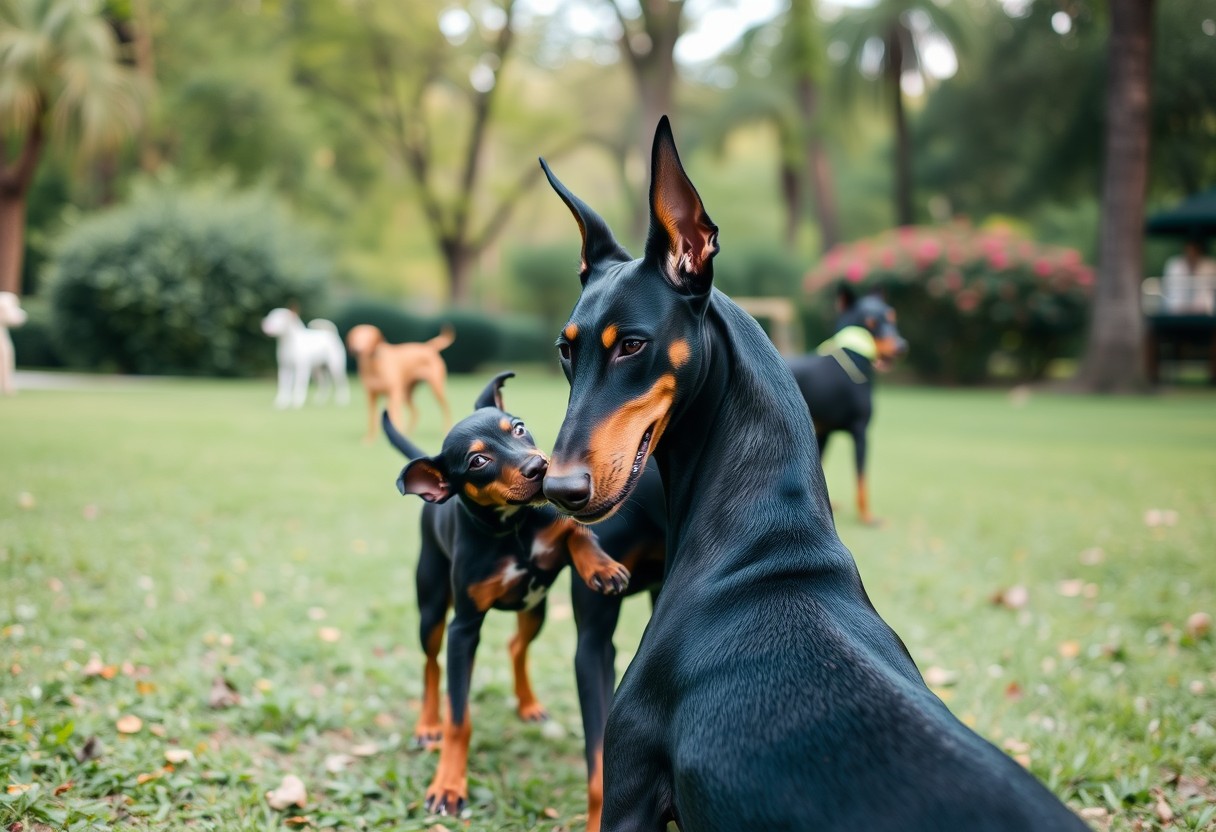
Key Takeaways:
- Proper Socialization: Doberman Pinschers need early and consistent socialization to develop good behaviors around other dogs.
- Temperament Factors: Individual temperament varies; some Dobermans may be more sociable while others may exhibit dominance or aggression towards other dogs.
- Training and Supervision: Ongoing training and supervision during interactions with other dogs are necessary to ensure positive experiences and prevent potential conflicts.
Understanding Doberman Pinschers
As you examine into the world of Doberman Pinschers, you’ll discover a breed known for its intelligence, loyalty, and protective nature. Originally bred for protection and companionship, these dogs have a rich history and have become one of the most admired breeds. Understanding their characteristics and temperament is crucial in knowing how they interact, particularly with other dogs.
Breed Characteristics
One standout feature of Doberman Pinschers is their sleek, muscular build, which gives them an imposing presence. They typically stand between 24 to 28 inches tall and have a short coat that is easy to groom. Their strong work ethic and high energy levels make them well-suited for various roles, including service dogs and military companions.
Temperament Traits
Breed characteristics significantly influence Doberman Pinschers’ temperament, contributing to their reputation as both gentle companions and formidable protectors. They are known for being intelligent, loyal, and especially devoted to their families. With proper training and socialization, you can harness their natural instincts while ensuring they are well-adjusted and friendly.
This breed’s temperament makes them exceptional family dogs, as they are typically affectionate and playful with loved ones. However, be mindful of their protective nature, as they may be wary of strangers and unacquainted dogs. To avoid any unwanted aggression, it’s crucial to start socializing your Doberman from a young age. Consistent training and positive reinforcement will help you shape their behavior, leading to a balanced and harmonious relationship with both humans and other pets.
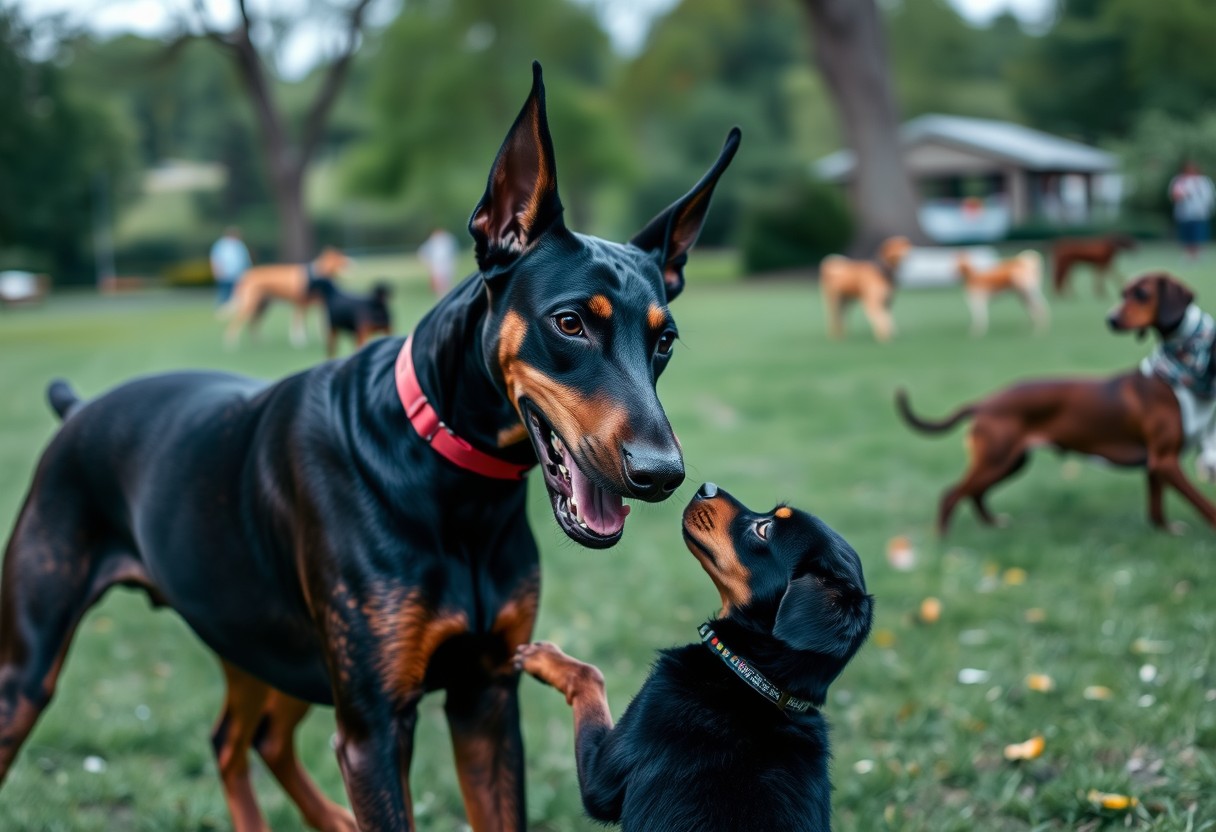
The Importance of Socialization
Any dog, including Doberman Pinschers, greatly benefits from socialization. This crucial process helps your pup learn how to interact with other dogs and people, reducing the risk of behavioral issues such as aggression or excessive fear. Proper socialization not only builds your dog’s confidence but also allows them to enjoy a happier and more balanced life. A well-socialized Doberman can be a friendly, loving companion, making your experiences together more enjoyable.
Early Socialization Benefits
On your Doberman’s journey, early socialization is key to raising a well-adjusted dog. Introducing your puppy to a variety of environments, people, and other dogs during the critical socialization window, typically between 3 to 14 weeks, can help shape their future behavior. Early experiences teach your Doberman to manage their reactions to different stimuli, setting the foundation for confidence and resilience as they grow.
Ongoing Socialization Practices
On the path to a well-socialized Doberman, it’s crucial to continue socialization throughout their life. Regularly exposing your dog to new experiences, such as encounters with different breeds, environments, and people, will maintain and enhance their social skills. This sustained practice helps prevent any regression in social abilities and promotes a calm and confident demeanor.
Practices such as group training classes, dog parks, and playdates with other dogs are excellent ways to keep your Doberman socially engaged. It’s vital to introduce your dog to the right social circles to ensure positive interactions; avoid overly aggressive or fearful dogs that could cause anxiety. Always monitor your dog’s body language during these interactions to recognize any signs of discomfort. By fostering a supportive social environment, you create a strong foundation for a well-mannered and balanced Doberman.
Interactions with Other Dogs
Once again, the temperament of your Doberman Pinscher plays a significant role in how they engage with other dogs. Early socialization is vital, as it helps your Doberman learn appropriate behaviors and communication signals. With proper exposure, they can interact well with other dogs, exhibiting friendly and confident behavior. Keep in mind, however, the importance of monitoring all interactions to ensure they remain safe and enjoyable for everyone involved.
Positive Play Situations
Other than basic obedience training, setting up positive play situations is crucial for your Doberman’s social skills. Favorable conditions include choosing dogs that match your Doberman’s energy level and ensuring a neutral territory for introductions. This can lead to fun, respectful interactions that build their confidence and foster positive relationships. Building a social network that includes various canines is incredibly beneficial for them.
Environmental Factors
One major aspect of your Doberman’s interactions with other dogs is the environmental factors you provide. Ensure that their surroundings are calm and secure, which can help reduce anxiety and promote positive behavior. A well-structured playdate may include:
- Neutral territory
- Controlled introductions
- Positive reinforcement
The comfort of the environment can greatly influence their demeanor and willingness to engage.
This also extends to the types of situations you expose your Doberman to. If they frequently encounter stressful settings, it may lead to fear or aggression toward other dogs. To ensure successful interactions, consider:
- Supervised gatherings
- Gradual exposure
- Positive experiences
The right environment is crucial in shaping your Doberman’s social behavior and overall happiness.
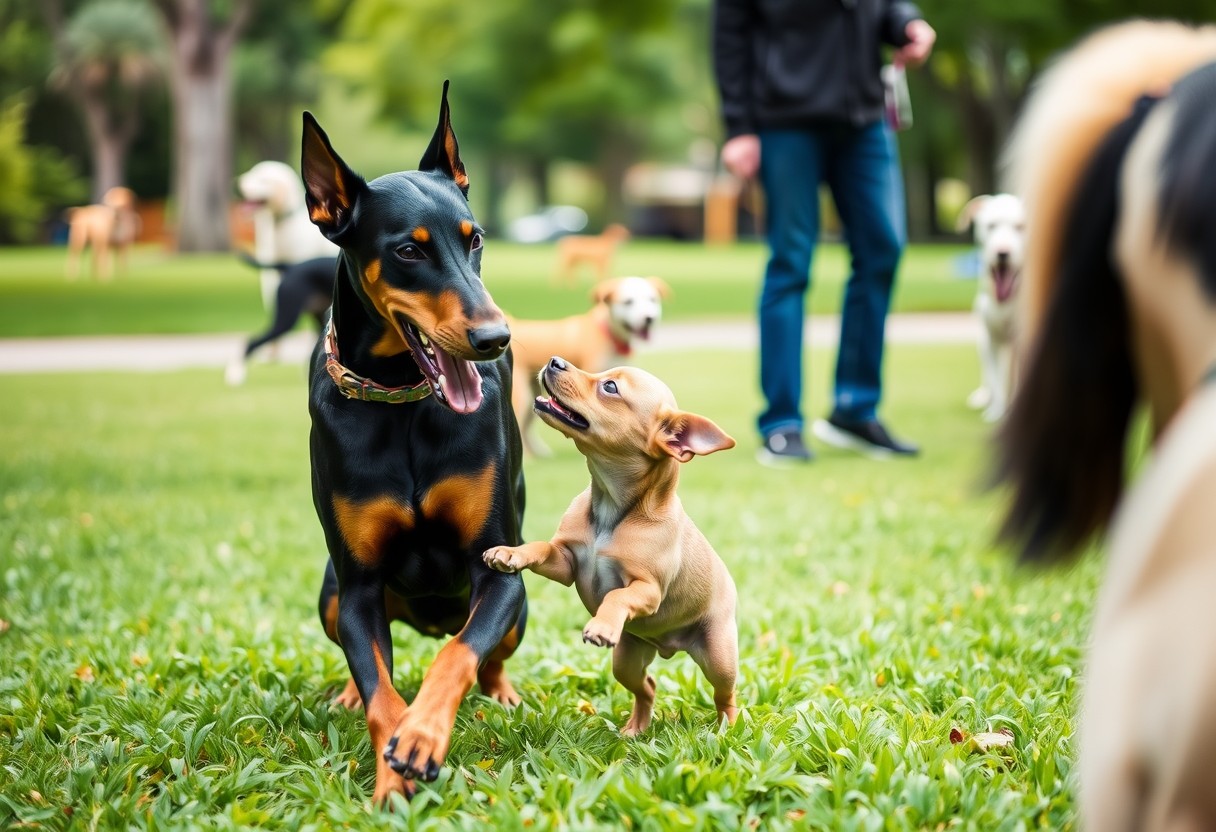
Training Techniques
For ensuring your Doberman Pinscher is good with other dogs, consistent training techniques are vital. Utilizing positive reinforcement, patience, and socialization strategies will help your pup learn to coexist peacefully with other canines. Regularly exposing your Doberman to various dogs, coupled with structured training sessions, will significantly contribute to their sociability.
Basic Commands for Socialization
The fundamental commands you teach your Doberman, such as ‘sit,’ ‘stay,’ and ‘come,’ are crucial for effective socialization. These commands create a framework for your dog to understand your expectations and will enhance their ability to interact appropriately with other dogs in different environments.
Encouraging Positive Behavior
With positive reinforcement, you can shape your Doberman’s interactions with other dogs. By rewarding good behavior, you encourage your pup to repeat those actions, fostering a more sociable temperament. Incorporate treats, praise, and playtime to reinforce positive moments, especially during meet-and-greets with other dogs.
A key to your Doberman’s success in dog socialization lies in building strong connections between positive behavior and rewards. When your dog remains calm or shows friendly behavior towards other dogs, be sure to reward them immediately with praise or treats. This habit develops a positive association with interacting with other dogs, reducing anxiety and aggression. Moreover, avoiding harsh corrections is crucial; negative experiences can instill fear and result in reactive behavior. By consistently practicing this encouragement, your Doberman will learn that positive interactions lead to enjoyable experiences. Be mindful of, patience and consistency are crucial throughout this training journey!
Signs of Stress or Aggression
Your Doberman Pinscher may exhibit various signs of stress or aggression when interacting with other dogs. These signs can range from subtle body language changes to overt aggressive behaviors. Watching for signs like growling, barking, or a stiff posture is crucial in ensuring safe interactions. Being aware of these behaviors will enable you to intervene before situations escalate, promoting a harmonious environment for your dog and others.
Recognizing Warning Signs
To effectively gauge your dog’s comfort level, be on the lookout for warning signs indicating discomfort or potential aggression. Signs may include raised hackles, a tucked tail, or intense staring. Understanding these cues helps ensure your Doberman remains friendly and relaxed during social outings.
Managing Conflicts
On the off chance that conflicts arise between dogs, quick action is crucial to prevent escalation. Remain calm and assertive, steering your Doberman away from the confrontation while maintaining control. Having treats or toys handy can redirect attention and diffuse tension. Knowing when to separate dogs and providing a safe space allows for better resolution.
The key to managing conflicts involves your reactions and the techniques you use. If a situation escalates, it’s vital to remain calm and not yell, as this can heighten your dog’s anxiety. Use a leash to create distance and encourage positive behaviors, rewarding your Doberman for calmness. In serious cases, consulting a dog training professional can provide solutions tailored to your pup’s needs. This way, you not only ensure your safety but also foster a more positive environment for future interactions.
Creating a Positive Environment
Keep in mind that a positive environment is crucial for your Doberman’s interaction with other dogs. By fostering an atmosphere of comfort and safety, you can help your pup feel more secure during socialization. Use treats, praise, and encouragement to create enjoyable experiences, which will reinforce their confidence around other dogs. This will not only enhance your dog’s social skills but also strengthen the bond between you and your furry friend.
Safe Spaces for Play
To ensure your Doberman feels relaxed and comfortable during playtime, create safe spaces where they can interact with other dogs. This could be a designated area in your yard or a local dog park. Make sure the environment is free from distractions and hazards, allowing your dog to focus on having fun without feeling overwhelmed.
Introducing New Dogs
Play a pivotal role in the process of introducing your Doberman to new dogs. Start with controlled encounters, such as meeting in a neutral space, to reduce territorial behaviors. Supervision is important to prevent any aggressive incidents. Remember to keep the initial meetings short and positive, using treats and praise to reinforce good behavior. Monitor body language closely to ensure both dogs are comfortable, and don’t hesitate to intervene if things get tense.
For instance, if you observe your Doberman showing signs of stress or aggression, it’s vital to redirect their attention through commands or by creating distance between the dogs. Take your time with the introductions; gradually increasing the duration of their interactions will allow both dogs to build trust. Positive reinforcement, such as treats or affection, can help create a friendly association with the presence of new friends. This thoughtful approach will go a long way in ensuring your Doberman develops positive relationships with other dogs.
Final Words
With these considerations, you can confidently navigate the social dynamics of your Doberman Pinscher around other dogs. By prioritizing early socialization, training, and positive experiences, you can help your furry friend become well-adjusted and friendly with others. Be mindful of, each dog is unique, and your patience and understanding will lead to wonderful relationships as your Doberman develops its social skills.
FAQ
Q: Are Doberman Pinschers inherently aggressive towards other dogs?
A: No, Doberman Pinschers are not inherently aggressive towards other dogs. However, their temperament largely depends on genetics, upbringing, and socialization. Dobies can be protective and loyal, but with proper socialization from an early age, they can learn to coexist and play well with other dogs. Introducing them to a variety of other dogs in a controlled and positive environment helps reduce any potential aggression.
Q: What is the best way to socialize a Doberman with other dogs?
A: The best way to socialize a Doberman with other dogs is to start early, ideally when they are still puppies. Take them to obedience classes, dog parks, or arrange playdates with other well-mannered dogs. Positive experiences and rewards can help them associate other dogs with good feelings. Always supervise initial interactions, and be mindful of their body language to ensure they are comfortable and not feeling threatened.
Q: Can an unsocialized Doberman ever learn to get along with other dogs?
A: Yes, an unsocialized Doberman can learn to get along with other dogs, but it may take time and patience. Gradual exposure to other dogs is important. Start with calm, friendly dogs that have a stable temperament and observe the interactions closely. Utilizing a professional dog trainer or behaviorist can also aid in this process if any aggressive or fearful behaviors are present. Consistent training and positive reinforcement are key to helping them adapt and socialize more effectively.



